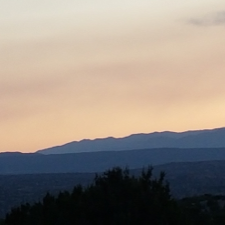Donald
The Beginning & The End
 Out in New Mexico recently, I was able to mix kayaking over Class 3 rapids, hiking at Tent Rocks National Monument, and eating at celebrated restaurants, with catching up with old friends – like former Governor Bill Richardson. In between, I spent some time at Santa Fe’s first-class museums.
Out in New Mexico recently, I was able to mix kayaking over Class 3 rapids, hiking at Tent Rocks National Monument, and eating at celebrated restaurants, with catching up with old friends – like former Governor Bill Richardson. In between, I spent some time at Santa Fe’s first-class museums.
One of these, the Museum of Indian Arts & Culture, covered economic and cultural changes over a millennium ago along the Mogollon Rim – a sharp drop-off between high and low deserts that stretches across almost all of Arizona and New Mexico, where I spent a lot of my youth. The original “basket-weaver” culture above the Rim is so-called because it knew no pottery. But eventually, the superior technology of pottery-making filtered its way in from elsewhere. So did the bow, whose superior firepower provided a more convenient means of defense than retreating each night atop the Rim, enabling villages to relocate down the steep escarpment to the valley below, where their crops grew. Here, in an ancient world far different from our own, communities were being uprooted, and perhaps for the unfortunate basket-weavers their source of livelihood destroyed, by “transborder” flows of new technologies and ideas.

Similar historical developments have been on my mind lately. My friends at the European branch of the Aspen Institute recently asked me to write on two seemingly-different subjects – the Trump Administration’s relationship with business, and the future of cities. But understanding where we are today, and where we’re heading, requires seeing these as merely the latest incarnation of tensions going back to the dawn of humanity.
My forthcoming piece for the journal Aspenia, entitled Urbi et Orbi (“To the City and the World,” the Pope’s traditional greeting), takes a roughly 60,000-year tour of the “[t]ension between nomadic, hunter-gatherer, and even pastoralist lifestyles, on the one hand and sedentism,” on the other. With a quick recap of the Cain and Abel story – about which I’ve written before as a parable of economic and political change not unlike today – the piece summarizes the intertwined emergence of both city and state as sources of increased sophistication and change, but also increased inequality and economic exploitation. Noting that “perhaps the most exploitive social and economic relations were always those between cities and the more traditional agricultural communities in their hinterlands,” the piece turns to an extended comparison between the food chains found in the natural world (drawn from my readings for Deep Policy discussed in the last update) and those in human societies:
The tripartite division between producers, transformers and predators described above generated the same dynamic that we see in today’s populism…. There is thus nothing new in today’s global clash between a largely urban, cosmopolitan, socially liberal society based on a transnational New Economy and a largely exurban, place-oriented, traditionalist society rooted in an increasingly-secondary or tertiary extractive economy.
My other recent article, Trump’s traditional Republican economic choices, argues that, despite the initial horror of the business elite and GOP establishment, they have all largely made their peace with Donald Trump – because his policies are really “perfectly consistent with what Republicanism, and to a lesser extent ‘conservatism,’ have long become.” These policies are instead – predictably – squeezing the very voters who supported and continue to support Trump and Republicans. As Urbi et Orbi shows, the same factors have played out historically in every polity since Ancient Greece.
I’m often asked by people on the Left why they should care about these benighted voters. The first answer is that peoples whose cultures and livelihoods (regardless of whether you share them) are threatened by change – whether the advent of pottery or the Internet – are precisely those about whom the Left ought to care.
The second is that, “The tragedy of the moment is that Trump’s opponents are offering very little to those on the short end of the stick from these developments, who are right to be angry – while Trump’s appeal to them is based purely on selfishness, not on what is best for the country as a whole. Unfortunately, the same can be said of the entire thrust of Trumponomics.” The piece concludes:
The symbiosis of government and business into one big rent-seeking enterprise is precisely what principled conservatism has opposed for decades, and criticized in modern liberalism…. Candidate Trump explicitly campaigned against just this – and yet, as both a private individual and as President, Donald Trump literally personifies it. In Trump’s America, more so than ever before, government itself is up for sale. This represents perhaps the logical end-point of the short-term, self-serving ideologies that passed for “conservatism” or “pro-business” in recent decades – but it also has represented the end-point of democratic and capitalist decline throughout history.

With former New Mexico Governor Bill Richardson
As always, I welcome your comments below.






